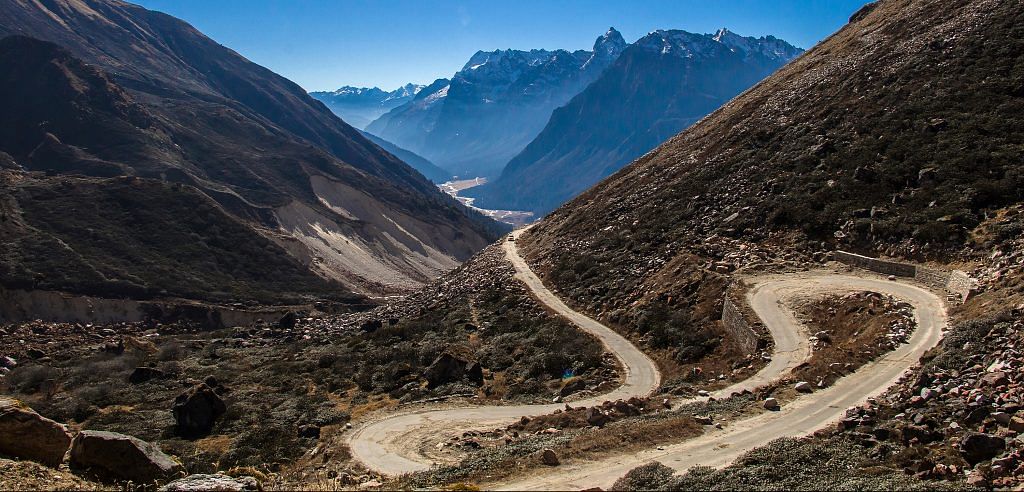Ex-Army chief Gen. Deepak Kapoor raises concerns of “single-access” roads near the border, which if blocked could end up isolating Indian troops.
New Delhi: Indian soldiers on the frontline run the risk of being isolated if adversaries cause landslides to block single-access roads, a tactic the Chinese had successfully adopted 56 years ago, former army chief Gen. Deepak Kapoor (retd) has told a parliamentary committee.
In most border areas, there is just a “single-access”, which is a “major problem today for a viable defence”, he was learnt to have said in his deposition before the parliamentary standing committee on external affairs.
For instance, there is just one road going from Bongrile to Shillong to Tawang and further east. In the Central sector, at Barahoti in Uttarakhand, the road stops 40 km short of the Line of Actual Control with the Chinese.
“When you have a single-access existing and if somehow the adversary is able to create landslides to cut off that access, sustaining the troops in those areas becomes a problem and it also opens a way for the adversary to take advantage, come right behind and make sure that your positions in the front get defeated,” an MP quoted Gen. Kapoor as telling the committee in February.
“Specifically, even in 1962, this is exactly what they (the Chinese) did. They shut off various accesses and the (Indian) troops got isolated. This is how they were exposed to a defeat in detail because the troops could not be sustained for a longer period of time,” he reportedly added.
The former Army chief further said that this negates even the advantage of having good soldiers.
“You may have good soldiers doing a lot of good fighting. But when you do not have options in deployment and responding to the enemy’s action, they would not be able to give their best…,” a committee member quoted the former army chief as saying.
Also read: One year after Doklam, China intrudes again – in Ladakh
‘Border outposts not connected’
Nearly half of the border outposts in the country are not connected by any sort of roads, Union home secretary Rajiv Gauba has briefed the parliamentary panel.
Gauba is learnt to have informed the committee that of the 176 border outposts, only 54 are connected by proper all-weather roads and 44 through tracks on which light and medium vehicles can ply but they are not all-weather. As many as 78 outposts are not connected by any kind of road.
In 2000, the government set up a China Study Group that identified 73 roads to be refurbished but only 27 have been completed so far.
Sources said Gen. Kapoor (retd) referred to the non-completion of roads, identified by the China Study Group, in his deposition.
“I am not talking which government, where, when and how. But somehow this infrastructure doesn’t exist and there is no alternate access existing if troops on the frontline need to have logistics. They cannot have it if this single-access on which we worked gets vulnerable,” he reportedly said.
Also read: Parliament panel report confirms ThePrint exclusive on China amassing troops near Doklam
Environmental, wildlife clearances among reasons for delay
The former Army chief cited environmental concerns for the delay in the upgrade of border infrastructure.
A number of states have declared various wildlife reserves and sanctuaries within a 50-km radius of the border. As a result, the Army has had to seek the permission of the National Green Tribunal and the Supreme Court to build infrastructure.
In Doklam, for instance, there is Pangolakha Wildlife sanctuary. Just to get a six-seven km track made, the army had to request the Supreme Court to send its empowered committee, which cleared it after three years.
“National security, to that extent, became a hostage to our laws,” Gen. Kapoor reportedly observed.
The home secretary said there were a number of reasons for the delay in building roads, including the way the Border Roads Organisation (BRO) operated and the fact that environmental and wildlife clearances took a very long time. The ministry of environment and forests has over the last two-three years significantly streamlined this process, he said.
Defence secretary Sanjay Mitra told the committee last October that the BRO essentially dealt with 61 roads on the Indo-China border of which it had achieved connectivity in about 68 per cent of them.
“On India’s side, we have very difficult terrain, unlike the Chinese where there is a plateau kind of thing. However, now the work has been taken up on a war footing,” another committee member quoted Mitra as saying.
The BRO has been extensively reorganised and its responsibilities have been shifted from the ministry of road transport to the ministry of defence, he added.
